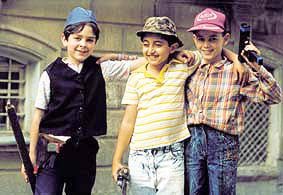|

Spring
1999 (7.1)
World War II
(1940-1945)
 
Yusif Samadoglu
(1935-1998)
Children's Game of
1946
Azeri
version
of the story
Photo above:
One of kids' favorite pastimes - playing war - popular in any
era. Baku 1995. Photo: Litvin
In "A
Children's Game of 1946," Yusif Samadoglu immerses the reader
in a child's game of make-believe. A young girl, Sakina, is playing
with a doll named Gular-the kind of doll that opens and shuts
its eyes when it's picked up or laid down. Sakina's playmates
are six childmates; three of them are her pretend "sons"-
the other three are the enemy. As the game progresses, the tragic
effects of war become more than just make-believe.
They were surrounded
- there was no way out. They sat with their heads hanging low.
All three of them were face to face with death. None of them
wanted to die-not Siavush, or Karim, or Nazim - but there was
little choice: either be taken captive or be killed. The enemy
had already threatened to drop an atom bomb on them if they did
not surrender. They themselves had no atom bomb; they had forgotten
theirs at home.
Sakina, the mother of Siavush, Karim and Nazim, was also there
in the trench. She was holding Gulzar, a tiny doll, close to
her chest, the only sister of the three brothers, and was singing
a lullaby to her:
"Sleep my baby, softly sleep,
The daisies are also asleep."
"Now your brothers will go off to fight," she said.
"They'll shoot and kill the enemies. Then they'll come back
as victors. And then we'll go home and have lunch. Do you know
what we'll have for lunch? A sweet bun, as big as that! I made
it myself. It tastes delicious. Only you must behave yourself.
If you cry, I'll leave you here surrounded by the enemy and you'll
get no bun at all. Is that clear?"
Sakina lifted Gulzar up. The doll opened its eyes immediately
and closed them again as soon as its mother laid it down.
"Sleep, little daughter," Sakina said, pressing the
doll's head to her chest. "In the evening, I'll take you
for a walk and then give you a bath. But no crying, mind you!
"Sleep my baby, softly sleep,
The daisies are also asleep."
When Sakina raised her head, she no longer saw her sons. "You
see, Daughter. Your brothers left. Now they are shooting-pah,
pah, pah! Soon they'll be back and we'll go home. Sleep now,
sleep..."
Suddenly someone shouted, "Eh, Sakina!"
She looked in the direction of the voice and saw at the end of
the trench, above a pile of crates, three enemy soldiers. One
of them snatched up a pistol with a barrel so long that it looked
like a rifle with a broken butt.
He aimed it at Sakina: "Why are you still alive?"
Sakina pursed her lips. "And why should I be dead?"
she replied. "We agreed from the very start that I wouldn't
die!" The enemy laughed. Brandishing his weapon, he shouted,
"You aren't playing by the rules! Your three sons are dead!"
Sakina got angry. "So what if they're dead? We agreed that
I wasn't going to die. Besides, you never even shot at me."
The enemy laughed again. "You're alone. We've thrown the
atom bomb! Over there, right next to the trench. So you must
be dead, too."
As Sakina jumped up, the doll fell down with a bang. The child
picked it up quickly and brushed the dust off its light yellow
hair. "Nothing of the kind," she said. "We agreed
beforehand that I wasn't going to die. You're the one who isn't
playing by the rules!"
There was a short silence. Then another enemy soldier approached
and gave a burst from his tommy-gun into the air. "Okay,"
he said. "Have it your own way. But when an atom bomb goes
off, radioactive rays spread out. They blind people"
Nobody seemed to understand what radioactive rays were. The tommy-gunner,
noticing general bewilderment, blinked and explained somewhat
hesitantly: "Of course...Father says that when an atom bomb
goes off, radioactive rays spread out. And they blind everyone"
Sakina shook her head and said stubbornly: "You're all liars!"
A third enemy soldier came up. "All right, if you don't
want to die, you don't have to...but you have lost three sons.
You must go crazy from grief!"
After a moment's consideration, Sakina nodded. She pulled the
red ribbons out of her neatly braided pigtails, shook her hair
over her shoulders and opened her eyes in a mad stare.
The enemies jumped down to the ground, and with shouts of "Hurrah!"
ran off somewhere.
The mother, who had gone mad, began to sing the lullaby again:'
"Sleep my baby, softly sleep,
The daisies are also asleep."
Then she spoke softly to the doll, "Your brothers have all
died. They'll never come back. They were killed by an atom bomb.
Now you're my only child. I have no one else. Only you. You see,
your mother has gone mad with grief. You mustn't cry, you mustn't
be naughty. Now we'll go home and I'll give you a sweet bun.
Then we'll bury your brothers. OK? Well, let's go."
Sakina picked up the doll. But the doll's eyes would not open.
Something had jiggled inside the doll's head; apparently the
mechanism was broken. Sakina shook the doll, but Gulzar's eyes
remained shut. The young mother, in tears, cried out, "Open
your eyes!"
But the doll's long eyelashes remained motionless as if glued
to its cheeks. The only sister of the three brothers, Sakina's
last child, had been blinded.
Translated
by Diana Russell for "Soviet Literature," Savva Dangulov,
editor, published by the Writer's Union of the USSR, Vol. 9,
1978.
From
Azerbaijan
International
(7.1) Spring 1999.
© Azerbaijan International 1999. All rights reserved.
|

